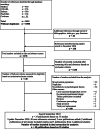Do psychological factors affect outcomes in musculoskeletal shoulder disorders? A systematic review
- PMID: 34147071
- PMCID: PMC8214793
- DOI: 10.1186/s12891-021-04359-6
Do psychological factors affect outcomes in musculoskeletal shoulder disorders? A systematic review
Abstract
Background: Psychological factors may impact recovery in patients undergoing treatment for shoulder complaints. The aim of this review is to systematically analyse the evidence for the effect of modifiable psychological factors (MPF) on outcome, for patients with musculoskeletal shoulder disorders undergoing conservative or surgical treatment. MPF refers to factors that may change with intervention.
Methods: This is a systematic literature review. Five databases searched (MEDLINE, CINAHL, Cochrane Library, Embase and PsycInfo), for longitudinal studies investigating the influence of MPF on prognosis of patients with shoulder disorders, all diagnoses, undergoing clinical interventions (conservative or surgical). Level of evidence was determined using Scottish Intercollegiate Guidelines Network (SIGN) methodology. Moderate and high quality evidence was included. We extracted all MPF, categorized constructs into the following domains: beliefs (self-efficacy, expectation of recovery), coping (catastrophizing, avoidant coping), and affect (depression, anxiety). We evaluated constructs for its predictive value of at least one outcome. Outcomes were informed by this review. Evidence was classified into three categories: evidence for, inconclusive evidence, and evidence against.
Results: Of 1170 references, 40 distinct publications based on 35 datasets were included (intervention type: 20 surgical; 20 conservative). Overall, 22 studies (20 cohort studies and 2 RCTs) were classified as high quality and 18 studies (16 cohort studies, 2 RCTs) were classified as moderate quality. Outcomes reported included pain, disability/function, perceived recovery, physical and mental health, and work status. Based on the review, of the psychological constructs explored, these data would suggest that expectation of recovery, catastrophizing, avoidant coping, depression, and anxiety may predict outcome for patients managed surgically. In patients undergoing conservative intervention the evidence was either against (catastrophizing, depression, anxiety) or inconclusive (self-efficacy, expectation of recovery, avoidant coping) for the predictive value of psychological factors on outcome.
Conclusions: Five constructs were predictive of outcome for surgically managed patients. This suggests that implementing the biopsychosocial approach (i.e., preoperative screening, intervention by a trained clinician) may be advantageous for patients recommended for shoulder surgery,,. The same is not indicated for conservatively managed patients as no conclusive association of MPF with outcomes was noted. The importance of other MPF on outcome requires further investigation.
Keywords: Conservative intervention; Modifiable psychological factors; Predictors; Surgical intervention; Treatment outcome.
Conflict of interest statement
The authors report no conflicts of interest.
References
-
- Macfarlane GJ, Beasley M, Smith BH, Jones GT, Macfarlane TV. Can large surveys conducted on highly selected populations provide valid information on the epidemiology of common health conditions? An analysis of UK biobank data on musculoskeletal pain. Br J Pain. 2015;9(4):203–212. doi: 10.1177/2049463715569806. - DOI - PMC - PubMed
Publication types
MeSH terms
LinkOut - more resources
Full Text Sources
Medical
Miscellaneous


